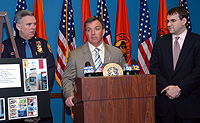January 2005
Commissioner Bogsted advances initiative to combat identity theft at ATM machines
“ATM fraud in the United States has grown over the years. Last year, 10 million people in the United States were victims of identity theft resulting in corporate losses totaling $48 billion and $5 billion in personal loses,” said Legislator Johnson at a press conference in Mineola. Commissioner of the Office of Consumer Affairs Roger C. Bogsted remarked, “The victims of these crimes include persons using the non-bank ATMs set up to steal their personal information and money. This legislation will go a long way in preventing the misuse of personal identities and it will also assist us as we work with other law enforcement agencies to combat identity crimes.” Nassau County Police Deputy Chief James Garside, an expert in identity theft prevention, said he supports the proposed legislation. According to Bank Security News, there are over 370,000 ATMs deployed throughout the United States. A growing number of them are non-bank owned or managed by third parties through independent networks. These machines can be simply obtained by store merchants and installed relatively quickly. Currently, there is no license or permit required for private ATM’s, making their owners untraceable and also allowing the ATM to serve as a potential instrument for money laundering, organized crime and terrorist groups. The lack of registration can also handicap law enforcement efforts to locate possible sources of identity or monetary theft. There have been several instances when the ATM has been rigged to obtain the user’s confidential information. Unlike bank ATMs, which are readily identifiable andregulated by the applicable federal and state laws, non-bank ATMs are unregulated and thus, make it difficult to trace ownership. To remedy this problem, a non-bank ATM would have to be registered with the Nassau County Office of Consumer Affairs before it could be put into operation under the Act. Further, certain information concerning the owner and distributor of the non-bank ATM would also have to be registered with Nassau County, thus enabling the County to trace the ownership of the ATM if identity theft or fraud occurs. Moreover, the Act also requires the installation of several public safety measures designed to protect the user of the ATM from attempts to steal his or her confidential information. Under the proposed legislation, the non-bank ATM must be placed in well-lit areas and be equipped with mirrors attached so that consumers can see behind them while conducting transactions. The law will require that:
To further protect consumers from identity theft, the law also prohibits Nassau Community College, contract agencies of the county and any county departments from using social security numbers as a means of identification or record keeping, unless required by federal or state law. It does still allow for the use of “last four digits” of social security numbers for identification purposes. Penalties for noncompliance by operators include a fine of up to $1,000 and/or a year in prison. The penalty for noncompliance by merchants includes a fine of up to $250. The law will become effective immediately from the time it is approved by the full legislature. The proposed law is expected to go through committees at the February 7 meeting of the legislature. |


